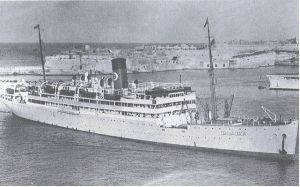SS Khedive Ismail: Difference between revisions
No edit summary |
No edit summary |
||
| Line 1: | Line 1: | ||
[[File:Khediveismail.jpg|right|thumb|''SS Khedive Ismail'']]The ''SS Khedive Ismail'' was a steamship sunk with great loss of life in 1944. On 6 February 1944 Convoy KR-8 sailed from Kilindini Harbour at Mombasa, Kenya to Colombo, Ceylon. The convoy consisted of five troop transports (''Khedive Ismail, City of Paris, Varsova, Ekma & Ellenga''), escorted by the heavy cruiser ''HMS Hawkins'' and the destroyers ''HMS Petard'' and ''HMS Paladin''. | [[File:Khediveismail.jpg|right|thumb|''SS Khedive Ismail'']]The ''SS Khedive Ismail'' was a steamship sunk with great loss of life in 1944. On 6 February 1944 Convoy KR-8 sailed from Kilindini Harbour at Mombasa, Kenya to Colombo, Ceylon. The convoy consisted of five troop transports (''Khedive Ismail, City of Paris, Varsova, Ekma & Ellenga''), escorted by the heavy cruiser ''HMS Hawkins'' and the destroyers ''HMS Petard'' and ''HMS Paladin''. | ||
The <i>Khedive Ismail</i> was an Egyptian transport of 7,513 tons requisitioned by the British for use as a troopship while docked at Bombay in 1940. The vessel was carrying 1,511 returning service personnel including 178 ships crew, 996 officers and men of the 301st Field Regiment, East African Artillery, 271 Royal Navy personnel and a detachment of 19 British Wrens. Also on board were 53 nursing sisters with one matron and 9 members of the WTS (Women's Transport Service, East Africa). While returning from Colombo, Ceylon, in convoy KR-8, the ship was torpedoed in the Indian Ocean at 14.33 hours. It took only 1 minute 40 seconds for the ship to sink taking 1,297 of her passengers and crew with her. There were 214 survivors including only six female passengers from the vessel, a victim of the Japanese submarine I-27 commanded by Lt | The <i>Khedive Ismail</i> was an Egyptian transport of 7,513 tons requisitioned by the British for use as a troopship while docked at Bombay in 1940. The vessel was carrying 1,511 returning service personnel including 178 ships crew, 996 officers and men of the 301st Field Regiment, East African Artillery, 271 Royal Navy personnel and a detachment of 19 British Wrens. Also on board were 53 nursing sisters with one matron and 9 members of the WTS (Women's Transport Service, East Africa). While returning from Colombo, Ceylon, in convoy KR-8, the ship was torpedoed in the Indian Ocean at 14.33 hours. It took only 1 minute 40 seconds for the ship to sink taking 1,297 of her passengers and crew with her. There were 214 survivors including only six female passengers from the vessel, a victim of the Japanese submarine I-27 commanded by Lt Cdr Fukumura. This was the greatest maritime tragedy involving female service personnel in British naval history. The Army nurses that died are commemorated on the Brookwood Memorial. | ||
===Nurses who died at sea on the ''SS Khedive Ismail''=== | ===Nurses who died at sea on the ''SS Khedive Ismail''=== | ||
Latest revision as of 08:44, 26 September 2024
The SS Khedive Ismail was a steamship sunk with great loss of life in 1944. On 6 February 1944 Convoy KR-8 sailed from Kilindini Harbour at Mombasa, Kenya to Colombo, Ceylon. The convoy consisted of five troop transports (Khedive Ismail, City of Paris, Varsova, Ekma & Ellenga), escorted by the heavy cruiser HMS Hawkins and the destroyers HMS Petard and HMS Paladin.
The Khedive Ismail was an Egyptian transport of 7,513 tons requisitioned by the British for use as a troopship while docked at Bombay in 1940. The vessel was carrying 1,511 returning service personnel including 178 ships crew, 996 officers and men of the 301st Field Regiment, East African Artillery, 271 Royal Navy personnel and a detachment of 19 British Wrens. Also on board were 53 nursing sisters with one matron and 9 members of the WTS (Women's Transport Service, East Africa). While returning from Colombo, Ceylon, in convoy KR-8, the ship was torpedoed in the Indian Ocean at 14.33 hours. It took only 1 minute 40 seconds for the ship to sink taking 1,297 of her passengers and crew with her. There were 214 survivors including only six female passengers from the vessel, a victim of the Japanese submarine I-27 commanded by Lt Cdr Fukumura. This was the greatest maritime tragedy involving female service personnel in British naval history. The Army nurses that died are commemorated on the Brookwood Memorial.
Nurses who died at sea on the SS Khedive Ismail
- AIREY, Freda
- ATKIN, Joyce Kathleen
- BATEMAN, Edith Mary
- BROWN, Amy
- BURROWS, Isabella
- Dalgarno, Elsie Alice
- Dann, Elizabeth Doritha
- Davies, Margaret Eluned
- Dervan, Gertrude
- Dewar, Alice Whitehead
- Dowling, Beatrice Olivia
- Farrelly, Mary
- FitzGerald, Catherine Mary
- Harvey, Grace Wesslink
- Hastings, Valerie Francis
- Humphrey, Muriel Christine
- Ievers, Eileen Mary Elsie
- Jarman, Marie
- Johnston, Maud Fredaline
- Kells, Maggie Jane
- Kells, Winifred Evelyn
- Leckey, Muriel Emily
- Leech, Barbara Elisabeth
- Littleton, Mary Joyce
- MacLaren, Jean Noel
- McMillan, Marion Lennox
- Moore, Isabella
- Morgan, Sarah
- Nuttall, Phyllis
- Pirie, Barbara
- RICHARDSON, Sybil Gwendoline
- Robertson, Helen Murray
- Senior, Doris Ena
- Smith, Marjorie
- Spence, Isobel
- Taylor, Katherine Mary Monica
- Thomas, Jane Mair George
- Urquhart, Mary Annie Ross
- Walker, Kathleen Hewison
- Warwick, Roberta Alice
- Whitaker, Mafalda Selene
- White, Gwendoline May
- Willis, Annie Amelia
- Young, Eleanor Jane

